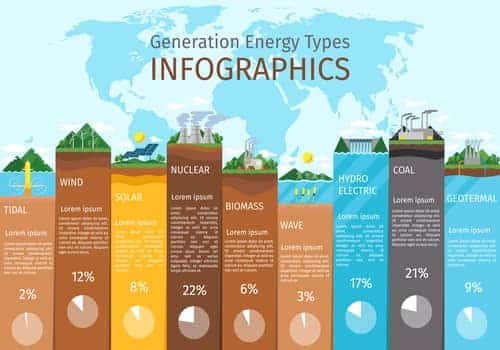
In today’s world, we are heavily reliant on energy for almost every aspect of our lives. From powering our homes and businesses to fueling transportation and manufacturing, energy is an essential component of modern society.
However, as concerns about climate change and environmental degradation grow, it’s becoming increasingly important to shift towards more sustainable and renewable sources of energy. In this blog, we will explore some of the most sustainable and good sources of energy, will tell you that Which Sources Of Energy are Sustainable?

Solar energy is one of the most sustainable sources of energy available. Solar panels convert sunlight into electricity, and this energy can be used to power homes, businesses, and even entire cities. Solar energy is abundant, renewable, and produces no greenhouse gas emissions. Although solar panels can be expensive to install, the costs are coming down rapidly, making solar energy an increasingly attractive option for many households and businesses.
Solar energy is one of the most sustainable sources of energy available today. It is a form of renewable energy that uses the sun’s rays to generate electricity. The sun is a powerful source of energy that emits an enormous amount of energy every day, and harnessing this energy has numerous benefits, so you may get the answer of Which Sources Of Energy are Sustainable?
Solar energy is sustainable because it is abundant, clean, and reliable. Unlike fossil fuels, which are finite resources that will eventually run out, solar energy is available in limitless amounts. The sun is expected to continue shining for billions of years, meaning that solar energy will always be available as a source of power.

Another reason why solar energy is sustainable is that it is a clean source of energy. Unlike fossil fuels, which release harmful pollutants into the atmosphere when burned, solar energy produces no emissions. This makes it an environmentally friendly option that can help to reduce our carbon footprint and combat climate change, so you may get the answer of Which Sources Of Energy are Sustainable?
Furthermore, solar energy is a reliable source of energy. While other forms of renewable energy, such as wind and hydro power, can be affected by weather conditions, solar energy is not. The sun shines every day, even on cloudy days, meaning that solar panels can still generate electricity even when it’s not particularly sunny.
In addition to its sustainability benefits, solar energy has numerous other advantages. For example, it can help to reduce energy costs, especially in areas where electricity prices are high. Installing solar panels on your home or business can also increase its value, making it a smart investment in the long run.
Overall, solar energy is a highly sustainable source of energy that offers numerous benefits over other forms of energy. As the world continues to look for ways to reduce our reliance on fossil fuels and combat climate change, solar energy is likely to play an increasingly important role in our energy mix, so you may get the answer of Which Sources Of Energy are Sustainable?
Wind Energy:(Which Sources Of Energy are Sustainable?)Wind energy is another renewable source of energy that is gaining popularity. Wind turbines use the power of the wind to generate electricity, and this energy can be used to power homes, businesses, and even entire communities. Wind energy is abundant, renewable, and produces no greenhouse gas emissions. However, wind turbines can be noisy and visually unappealing, and there may be concerns about their impact on wildlife.
Wind energy is another sustainable source of energy that is becoming increasingly popular around the world. Like solar energy, wind energy is a form of renewable energy that uses the power of nature to generate electricity. Wind turbines are designed to capture the energy from the wind and convert it into electricity that can be used to power homes, businesses, and communities.
Wind energy is a sustainable source of energy because it is abundant, clean, and renewable. The wind is a free and limitless resource that is available all over the world. Unlike fossil fuels, which are finite resources that will eventually run out, wind energy is available in limitless amounts as long as the wind keeps blowing, so you may get the answer of Which Sources Of Energy are Sustainable?
Furthermore, wind energy is a clean source of energy that produces no emissions. Unlike fossil fuels, which release harmful pollutants into the atmosphere when burned, wind energy produces no greenhouse gases or air pollutants. This makes it an environmentally friendly option that can help to reduce our carbon footprint and combat climate change.

Another advantage of wind energy is that it is a reliable source of energy. While the wind can be unpredictable, modern wind turbines are designed to capture energy from wind speeds as low as 6-7 miles per hour and can continue to generate power in wind speeds of up to 90 miles per hour. With proper planning and maintenance, wind turbines can be relied upon to generate power on a consistent basis, so you may get the answer of Which Sources Of Energy are Sustainable?
In addition to its sustainability benefits, wind energy has numerous other advantages. For example, it can help to reduce energy costs, especially in areas where electricity prices are high. It can also create jobs and boost local economies, especially in areas where wind energy is abundant, so you may get the answer of Which Sources Of Energy are Sustainable?
However, like all sources of energy, wind energy also has its limitations and drawbacks. For example, wind turbines can have an impact on wildlife, particularly birds and bats. They can also be noisy, and some people find them visually unappealing. Additionally, wind energy is most effective in areas with consistent and strong winds, which may not be available in all parts of the world.
Despite these limitations, wind energy is a highly sustainable source of energy that offers numerous benefits over other forms of energy. As the world continues to look for ways to reduce our reliance on fossil fuels and combat climate change, wind energy is likely to play an increasingly important role in our energy mix, so you may get the answer of Which Sources Of Energy are Sustainable?
Geothermal Energy:(Which Sources Of Energy are Sustainable?)Geothermal energy is a sustainable source of energy that harnesses the heat from the earth’s core. This heat can be used to generate electricity, heat buildings, and provide hot water. Geothermal energy is renewable, produces very few greenhouse gas emissions, and is often cheaper than traditional fossil fuels. However, it is limited to areas with geothermal activity, and the process of extracting geothermal energy can be costly and complex.
Geothermal energy is a sustainable source of energy that harnesses the heat from the Earth’s interior to generate electricity. This form of renewable energy relies on the natural heat that is produced by the Earth’s core, which is transmitted to the surface through geological processes such as volcanic activity and geothermal gradients, so you may get the answer of Which Sources Of Energy are Sustainable?
Geothermal energy is sustainable because it is renewable, abundant, and has a minimal environmental impact. Unlike fossil fuels, which are finite resources that will eventually run out, geothermal energy is constantly replenished by the Earth’s natural processes. It is also available in almost every part of the world, making it a highly reliable source of energy, so you may get the answer of Which Sources Of Energy are Sustainable?

Furthermore, geothermal energy is a clean source of energy that produces no emissions. It does not require the burning of fossil fuels, which can release harmful pollutants into the atmosphere and contribute to climate change. This makes geothermal energy an environmentally friendly option that can help to reduce our carbon footprint and combat global warming.
Another advantage of geothermal energy is that it is a highly efficient source of energy. Unlike solar or wind power, which can be intermittent depending on weather conditions, geothermal energy is available 24 hours a day, 365 days a year. This makes it an ideal source of baseload power, which is essential for meeting the energy needs of communities and businesses on a consistent basis, so you may get the answer of Which Sources Of Energy are Sustainable?
In addition to its sustainability benefits, geothermal energy has numerous other advantages. For example, it can help to reduce energy costs, especially in areas where traditional sources of energy are expensive or difficult to access. It can also create jobs and stimulate economic development in regions with geothermal resources.
However, like all sources of energy, geothermal energy also has its limitations and drawbacks. For example, the development of geothermal energy resources can be expensive and time-consuming, requiring significant upfront investment and extensive geological surveys. Additionally, geothermal energy is only available in certain parts of the world, which limits its potential as a global energy source, so you may get the answer of Which Sources Of Energy are Sustainable?
Despite these limitations, geothermal energy is a highly sustainable source of energy that offers numerous benefits over other forms of energy. As the world continues to transition to a low-carbon energy system, geothermal energy is likely to play an increasingly important role in our energy mix.
Hydroelectric Energy:(Which Sources Of Energy are Sustainable?)
Hydroelectric energy is a sustainable source of energy that harnesses the power of moving water to generate electricity. It is a form of renewable energy that relies on the natural water cycle to generate electricity, and has been used for centuries to power mills and other machinery.
Hydroelectric energy is sustainable because it is renewable, abundant, and has a minimal environmental impact. Unlike fossil fuels, which are finite resources that will eventually run out, the water cycle is a continuous and renewable process that can be harnessed to generate electricity. Additionally, hydroelectric energy does not produce any greenhouse gases or air pollutants, making it a clean and environmentally friendly option for generating electricity, so you may get the answer of Which Sources Of Energy are Sustainable?
Furthermore, hydroelectric energy is highly efficient and reliable. Unlike solar or wind power, which can be intermittent depending on weather conditions, hydroelectric energy is available 24 hours a day, 365 days a year. This makes it an ideal source of baseload power, which is essential for meeting the energy needs of communities and businesses on a consistent basis, so you may get the answer of Which Sources Of Energy are Sustainable?

In addition to its sustainability benefits, hydroelectric energy has numerous other advantages. For example, it can help to reduce energy costs, especially in areas where traditional sources of energy are expensive or difficult to access. It can also create jobs and stimulate economic development in regions with hydropower resources.
However, like all sources of energy, hydroelectric energy also has its limitations and drawbacks. For example, the construction of large hydroelectric dams can have significant environmental impacts, including the displacement of communities and the disruption of ecosystems. Additionally, hydroelectric energy is only available in certain parts of the world, which limits its potential as a global energy source, so you may get the answer of Which Sources Of Energy are Sustainable?
Despite these limitations, hydroelectric energy is a highly sustainable source of energy that offers numerous benefits over other forms of energy. As the world continues to transition to a low-carbon energy system, hydroelectric energy is likely to play an important role in our energy mix, particularly in areas with abundant water resources.
Hydroelectric energy is generated by harnessing the power of moving water, such as rivers and waterfalls. Hydroelectric energy is renewable, produces very few greenhouse gas emissions, and can be used to generate large amounts of electricity. However, the construction of dams and other infrastructure needed for hydroelectric power can have negative environmental impacts, such as altering the flow of rivers and disrupting wildlife habitats, so you may get the answer of Which Sources Of Energy are Sustainable?
Conclusion
There are a number of sustainable and good sources of energy available, including solar, wind, geothermal, and hydroelectric energy.
Each of these sources has its own advantages and disadvantages, and the best choice will depend on a variety of factors, such as geography, local resources, and energy needs.
By shifting towards more sustainable and renewable sources of energy, we can help protect our planet for future generations and build a more resilient and sustainable future, so you may get the answer of Which Sources Of Energy are Sustainable?
You can also visit science direct website or gain more knowledge from our website.




Leave a Reply
You must be logged in to post a comment.